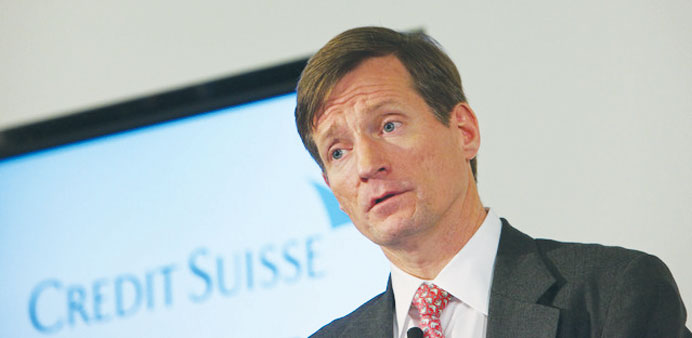|
Credit Suisse raised the pay of its chief executive by a third in 2012, a move likely to stoke public and political anger over banker pay after a year in which the Swiss group’s profits fell and its shares stalled. |
Brady Dougan, leading a drive to reduce risky assets, improve capital levels and cut costs, received 7.8mn Swiss francs ($8.2mn) last year, the bank said in its annual report published on Friday.
Anger at pay levels has already driven Swiss voters to back some of the world’s strictest controls on executive pay, forcing public companies to give shareholders a binding vote on compensation.
European officials, emboldened by a victory to cap banker bonuses, are expected to follow suit.
Credit Suisse’s local banking rival UBS, which was bailed out by the Swiss government nearly five years ago, drew fire last week when it disclosed a near $9mn 2012 payout for chief executive Sergio Ermotti and a $26mn welcome package for its new investment bank chief.
Credit Suisse said yesterday chairman Urs Rohner’s pay also rose by one third to 5.2mn francs, while its top earner for the second year running was Robert Shafir, who was promoted to co-head of the newly merged private bank and asset management unit in November.
Shafir’s overall pay was 10.6mn francs ($11.26mn), up from 8.5mn francs in 2011. Shafir is also head of the Americas for Credit Suisse.
The bank’s pay committee said the rewards were justified for the progress made in restructuring the business.
However Brigitta Moser-Harder, an outspoken retail shareholder of UBS and Credit Suisse who successfully campaigned for the Swiss pay curbs, condemned the rewards for Dougan, Shafir and Rohner amid a drop in Credit Suisse’s profits.
“The questionable argumentation that the three did their jobs very well shows once again that it’s not effective performance that is measured,” she told Reuters.
Credit Suisse’s net profit fell 24% to 1.48bn Swiss francs last year and the bank kept its mostly stock dividend unchanged.
Banks are generally taking a harder line on executive pay.
Deutsche Bank docked the pay of co-chief executives Anshu Jain and Juergen Fitschen, for example, after it was forced to restate earnings due to additional, unexpected legal provisions. Jain and Fitschen earned €4.8mn ($6.2mn) each in 2012.
US rival JP Morgan Chase, meantime, halved the bonus of chief executive Jamie Dimon after the bank suffered huge trading losses. His overall pay was $11.5mn last year.
Credit Suisse has also pledged to cap the bonus pool for its nine-person top management team at 2.5% of underlying net profit. Top management earned 74.1mn as a group in 2012, or roughly 2.1% of the profits.
“The wake-up call of the Swiss pay vote and the financial crisis has heightened awareness on boards that excesses, in particular in banking, cannot happen anymore,” said Axel May, consultant with Zurich-based compensation advisory firm Hostettler, Kramarsch & Partner.
However, the rewards are still handsome and it is unclear whether the reforms taken so far will mollify public anger.
The head of Barclays’ investment bank, Rich Ricci, this week sold more than £17mn ($25.8mn) in shares he received in a long-term pay deal.
Dougan’s pay package included a 500,000-franc unrestricted cash bonus and 2.5mn in base pay, as well as short- and long-term stock awards.
The chief executive sparked a storm of criticism in 2010 when he received about 70mn francs in shares from a 2004 stock-linked bonus plan and was awarded 19mn for 2009.
Part of Shafir’s pay was a 1.87mn-franc share in the bank’s private equity and hedge funds, meant to tie his interests with those of a wider asset management restructuring.
Shafir, who was granted a stake in alternative investment funds in 2008, could be set for awards of $10mn if the funds achieve certain returns over their lifetime of up to fifteen years, according to footnotes in the annual report.

